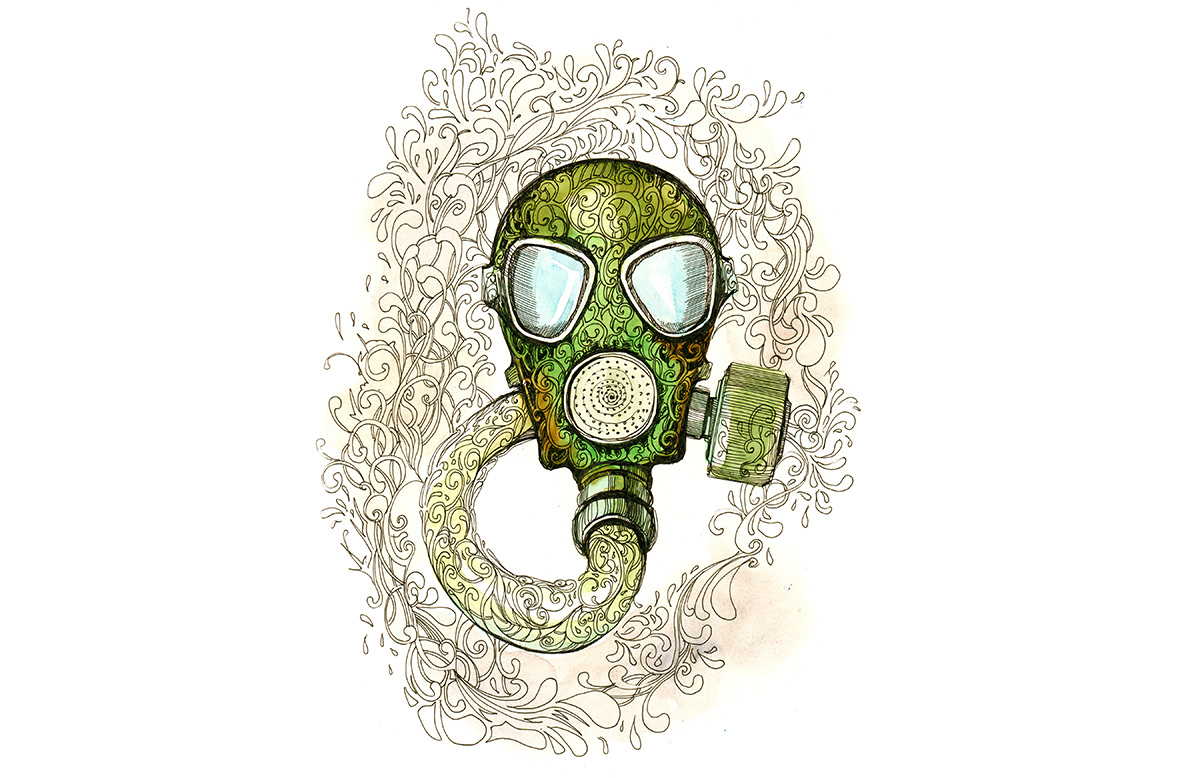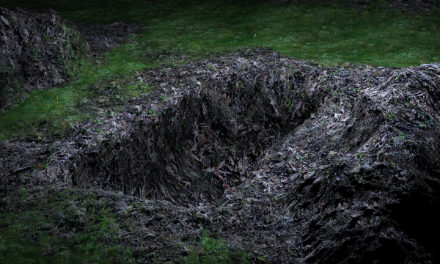For a Few Tins of Food
by Tricia Lowther
Issue 4: Faith | 1,383 words

©okalinichenko
The gun aimed at my chest gleams in the violent sunset.
I raise my hands, “You don’t want to do that.”
The man with the gun is short and wiry. Restlessness animates his ratty eyes. His lanky companion is a gormless lump in comparison. Both are bearded, thin, filthy.
We’re on the railway lines, all grown over now of course, a good source of nettles, hogweed, and wild garlic. I’ve been showing Mia how to tell the latter apart from similar but poisonous plants, like Lily of the Valley. She’s close behind me, watchful.
Ratty slips her an appraising look and I jerk my head her way, “We’re foraging experts. We can help you.”
He smirks, holding the gun steady, “Is that so? A middle-aged bint and a child are to be our saviours?”
“I’m Rachel,” I say. Basic psychology—try to build up a relationship with the aggressor. “This is my daughter Mia. She’s eight.” The last bit is an afterthought. If I knock a couple of years off, maybe they’ll be less likely to hurt her.
The gormless one snorts, then spits.
A whispered “yuck” from Mia.
I keep my voice level, try to project confidence. “We know this countryside. We know about plants—what’s edible and what’s poisonous. And we can hunt.”
He lowers the gun. “Hmm. Are you offering to cook us a gourmet dinner?” He sniggers.
Prickles skitter across my shoulders. “I could make you a meal like you haven’t had in years.”
He looks scornfully at the basket hooked over my elbow and full of roots, leaves, and stems. “What. With a basket full of grass?”
“We have meat.” Mia holds out her drawstring bag.
He pounces on it, peers in, then looks her up and down. “Young and tender,” he sneers, “just how I like it.”
A snake coils in my gut.
His tongue pokes out from between cracked lips. He smirks at his sidekick, “Maybe we could have ourselves some fun here?”
“She’s just a child,” I mutter, and he smirks again. He waggles the gun to indicate we walk ahead.
We’re marched to an end terrace at the edge of the nearby estate. The house looks much like all the others, windows smashed, door kicked in. In the first months after the end, the mob ruled, and when they’d emptied the shops, they targeted houses. People who had something to protect didn’t last long. If they withstood the initial attacks, they got burned out.
Ratty pushes Mia in front of him, his fist bunched around a clump of her hair. Gorm’s breath is heavy on my neck.
We enter the kitchen via a side door. The light is almost gone, but through the window to the back garden, I note bindweed, dandelions, and nettles—all edible. In front of us are floor-to-ceiling shelves, empty and thick with dust. The middle section, which opens onto cellar steps, turns out to be a hidden door. I wonder, were they preppers or did they find the place? Did they kill for it? Gorm thrusts an oil lamp into my hands and locks up behind us.
The basement is small and smells of foot sweat with an undertone of sour milk. The dim light shows me that they’re well stocked. Row upon row of tins, as well as other food, supplies, and equipment, line shelving units along the walls. Gorm lights a couple of candles and I get a better look at what they’ve got. The snake inside me coils tighter, they don’t need us.
Still, Ratty is interested. He thrusts his chin at me. “Where’ve you been hiding out?”
“Panic room. Withens Hill,” I say. Let them think we might have something they want.
Gorm sounds puzzled, “We’ve been right through there, a few times. Didn’t find a thing.”
“It’s well hidden.”
I scan for exit points. There’s a small sofa against the back wall with a low table in front of it, a sleeping area next to the stairs. Looks like it’s just the two of them here. No windows. The door at the top of the stairs is the only way out.
Ratty’s eyes flick to Mia again, linger.
“If you let me have that…” I gesture to the bag he still holds, make eye contact with him, though not too much, “we can get started?”
He shakes his head. “No need. We know how to cook.”
Fuck.
“Not like us. Mia and me, we’re brilliant cooks. Truly.” The “truly” is too high pitched.
I turn to Gorm, spread my palms. “Give us a chance to show how useful we can be?”
He looks at Ratty. “Why not? See what they can do.” He leers at me, “Food first, fun after.” He rubs his crotch.
I swallow a gag.
I keep Mia close. “I need you to help me clean up these roots, sweetheart.”
I skin the rabbit fast, push chunks of it around the pan. Amazing how many of the little critters survived, given that they were once hunted down by everyone with an air rifle, catapult, or well-aimed rock. They’ve recovered well. Animals turned out to be more resilient than humans.
Ratty takes too keen an interest in everything I add to the pan. “What’s that?”
“Wild garlic. Can’t you tell?” I offer him a leaf to sniff. He crinkles his nose, looks more rat-like than ever.
“What are those?”
“Wild parsnip, tastes better than the stuff the shops used to sell,” I lie. I’ve pulled my plastic gloves on. “This stuff can irritate the skin when it’s raw.” I point at the hogweed stalks, “but it’s fine when it’s cooked, look.” I pull a stalk from the pan, bite it in half, and offer him the rest, which he chews thoughtfully while he watches.
Sweat trickles down my spine. I add a little water and throw in the last of our carefully selected greenery. My mouth fills at the meaty, garlicky smell. We haven’t eaten in hours.
There are two mess tins waiting to be filled. “Might let you have some of my leftovers, if you’re nice to me.” Ratty smiles at Mia.
He picks up his tin and sniffs it, then moves to the sofa and gestures at us to sit on the floor nearby. He keeps the gun on his lap. Gorm plonks himself down too and we watch as they dive into the food, like pigs at troughs, grunting, grinding, and slavering.
Time slows. Their forks screech like nails down blackboards, each chew like a boot squelching in mud. I slow my breathing, in, out, flex my fingers.
Too soon, they’ve finished. Ratty sighs, belches, stands. He aims the gun at Mia and jerks his head towards the filthy mattress.
My stomach twists, and my hand stays tight on her shoulder. I stare at the shine on his forehead. He tells Gorm, “Get the bint tied up. She can watch.” He wipes his forehead with the back of his hand. “Do as I fucking say. Now!”
Then his hand clutches his stomach.
He staggers forward. The gun hits the floor and I dive for it. Gun in hand, I point it at Gorm. He’s up, has a knife, looks confused.
Ratty curls up, wails, “Fuckinguuurgh!”
Gorm hits the deck.
“Told you we know our stuff.” From my position on the floor I wriggle, back to the wall, the gun gripped in both clammy hands. “The convulsions won’t last long.”
We watch them scream, twitch, and vomit. Until they stop.
“Look, Mum!” Mia squeals. “Macaroni cheese!”
I look to where she’s pointing and grin. “Good spot! Let’s see what else they have.”
We load our backpacks with as many supplies as we can carry. “Maybe they were cleverer than they seemed,” I say.
Mia throws them a disgusted look. “No. They were stupid, bad men. Can we go now? They smell.”
She’s right. They’ve emptied their bowels. I nudge Ratty’s head with my toe, and a low groan escapes him. “Sick and dying,” I say, “just how I like it.”
At the top of the steps I listen for a minute before I unlock the door. We slip quietly home through the dark streets. There are people who’ll kill for a few tins of food.

Tricia Lowther
Tricia Lowther is a freelance writer from Northern England. Her writing has been published widely, including by The Guardian, The New Republic




